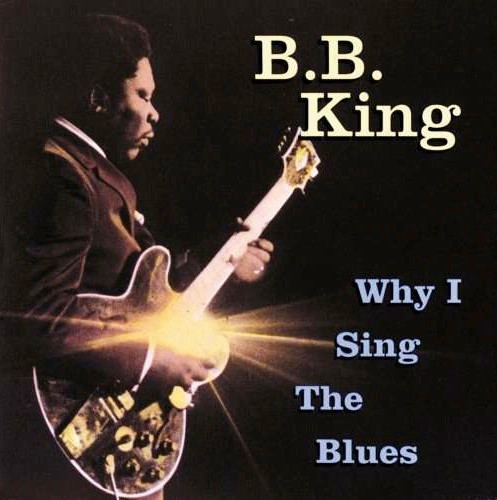Spotify Release Info

Track: Why I Sing The Blues
Artist: B.B. King
Album: Live And Well
Artist Bio

Name: B.B. King
Spotify Genres: blues, classic blues, jazz blues, soul blues, blues rock
Followers: 2,843,320
Popularity:
Biography
American blues singer, guitarist, and songwriter born September 16, 1925 near Itta Bena, Mississippi and died May 14, 2015, Las Vegas, Nevada. B.B. is an abbreviation for 'Blues Boy'. King is one of the most influential blues musicians of all time, earning the nickname "The King of the Blues." He is considered one of the "Three Kings of the Blues Guitar" (along with [a=Albert King] and [a=Freddie King], none of whom are related). Since he started recording in the 1940s, he released over fifty albums. He previously worked as a tractor driver. In his youth, he played on street corners for dimes, and would sometimes play in as many as four towns a night. In 1947, he hitchhiked to Memphis, TN, to pursue his music career. In Memphis, B.B. stayed with his cousin [a=Bukka White], one of the most celebrated blues performers of his time, who B.B. credits as one of his earliest mentors and teachers. King's first big break came in 1948 when he performed on [a=Sonny Boy Williamson]’s radio program on KWEM out of West Memphis. This radio performance led to steady engagements at the Sixteenth Avenue Grill in West Memphis and later to a ten-minute spot on the Memphis radio station WDIA. King's radio spot become so popular, it was expanded and became the “Sepia Swing Club.” As King worked at WDIA as a singer and disc jockey, he was given the catchy radio nickname "Beale Street Blues Boy", later shortened to "Blues Boy", and finally to "B.B." In the late 1940s and early 1950s, King was a part of the blues scene on Beale Street. "Beale Street was where it all started for me", King said. He performed with [a=Bobby Bland], [a=Johnny Ace], and [a=Earl Forest] in a group known as [a=The Beale Streeters]. In 1949, King made his recording debut on [l=Bullet (2)] ([l=Bullet Recording & Transcription Co.]) by issuing the single [url=https://www.discogs.com/release/7031392-BB-King-Miss-Martha-King-When-Your-Baby-Packs-Up-And-Goes]"Miss Martha King"[/url], which did not chart well. Later that year, he began a recording contract with Los Angeles-based [l=RPM Records (5)]. Many of King's early recordings were produced by [a=Sam Phillips (2)] (who later founded [l=Sun Record Company]). King's recording contract was followed by tours across the US, with performances in big city theatres as well as gigs in small clubs and juke joints in the southern United States. During one show in Twist, Arkansas, a fight broke out between two men and caused a fire. King evacuated with the rest of the crowd, but realizing he left his acoustic guitar inside, rushed back inside the burning building to retrieve it. He later discovered the two men were fighting over a woman named Lucille. Ever since, each one of B.B.’s trademark Gibson guitars has been called Lucille, as a reminder not to fight over women or run into any more burning buildings. In 1952, B.B. had a number one hit with “Three O’Clock Blues,” and began touring nationally soon after. 1956 became a record-breaking year, with 342 concerts booked and three recording sessions. That same year he founded his own record label, [l=Blues Boys Kingdom], with headquarters at Beale Street in Memphis. In 1962, King signed to [l=ABC-Paramount] Records, which was later absorbed into [l=MCA Records]. In November 1964, King recorded the [Link] album, considered to be one of his finest recordings. In 1968, B.B. played at the [l=Newport Folk Festival] and at [a=Bill Graham (2)]’s [l=Fillmore West] on bills with the hottest contemporary rock artists of the day who idolized B.B. and helped to introduce him to a young white audience. In 1969, B.B. was chosen by [a=The Rolling Stones] as the opening act for their American tour. He won a 1970 Grammy Award for his version of the song "The Thrill Is Gone", which was a hit on both the Pop and R&B charts. It also gained the number 183 spot in Rolling Stone magazine's 500 Greatest Songs of All Time. From the 1980s until his death in 2015, he maintained a highly visible and active career, appearing on numerous television shows and performing as much as 300 nights a year. B.B. was inducted into the Blues Foundation Hall of Fame in 1984 and into the Rock And Roll Hall of Fame in 1987 (Performer).
Special Offer
B.B. King on Amazon
Check this outPopular Tracks on Spotify
-
1.The Thrill Is GoneCompletely Well
-
2.The Thrill Is GoneDeuces Wild
-
3.When Love Comes To TownRattle And Hum
-
4.Riding With the KingRiding With The King
-
5.Bring It On Home To MeDeuces Wild
-
6.Chains And ThingsIndianola Mississippi Seeds
-
7.Blues Boys TuneBlues On The Bayou
-
8.The Thrill Is GoneB.B. King & Friends - 80
-
9.Why I Sing The BluesLive And Well
-
10.Ten Long YearsRiding With The King
Discogs Release Info

Release: B.B. King - Why I Sing The Blues
Year: 1992
Genres: Blues
Styles: Chicago Blues, Rhythm & Blues







